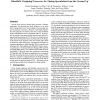Free Online Productivity Tools
i2Speak
i2Symbol
i2OCR
iTex2Img
iWeb2Print
iWeb2Shot
i2Type
iPdf2Split
iPdf2Merge
i2Bopomofo
i2Arabic
i2Style
i2Image
i2PDF
iLatex2Rtf
Sci2ools
105
Voted
HPCA
2009
IEEE
2009
IEEE
Blueshift: Designing processors for timing speculation from the ground up
Several recent processor designs have proposed to enhance performance by increasing the clock frequency to the point where timing faults occur, and by adding error-correcting support to guarantee correctness. However, such Timing Speculation (TS) proposals are limited in that they assume traditional design methodologies that are suboptimal under TS. In this paper, we present a new approach where the processor itself is designed from the ground up for TS. The idea is to identify and optimize the most frequently-exercised critical paths in the design, at the expense of the majority of the static critical paths, which are allowed to suffer timing errors. Our approach and design optimization algorithm are called BlueShift. We also introduce two techniques that, when applied under BlueShift, improve processor performance: On-demand Selective Biasing (OSB) and Path Constraint Tuning (PCT). Our evaluation with modules from the OpenSPARC T1 processor shows that, compared to conventional TS, B...
Average Processor Power | Computer Architecture | Conventional Ts | HPCA 2009 | OpenSPARC T1 Processor |
| Added | 25 Nov 2009 |
| Updated | 25 Nov 2009 |
| Type | Conference |
| Year | 2009 |
| Where | HPCA |
| Authors | Brian Greskamp, Lu Wan, Ulya R. Karpuzcu, Jeffrey J. Cook, Josep Torrellas, Deming Chen, Craig B. Zilles |
Comments (0)

